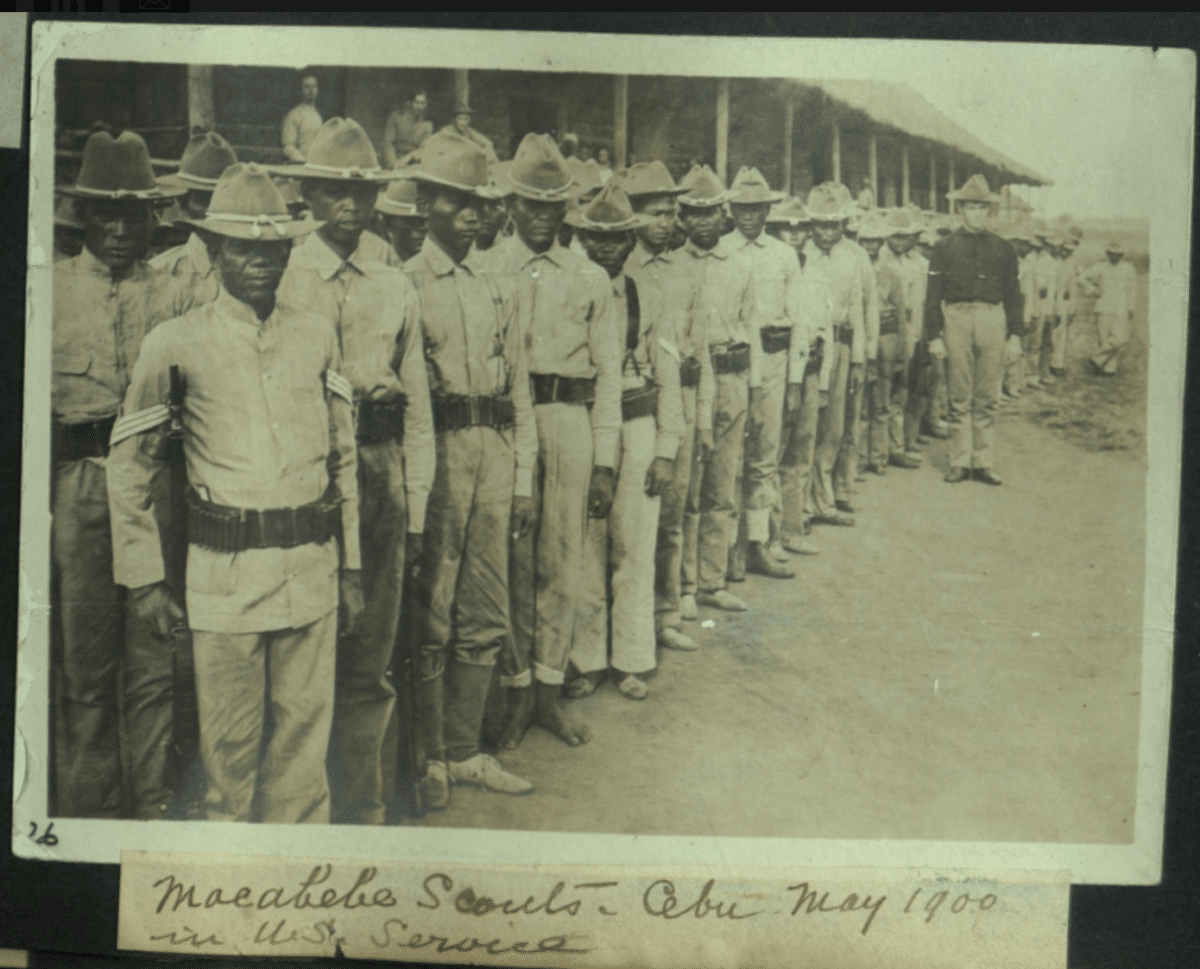September 1899: The organization of the Macabebe Scouts

The Macabebe Scouts / Photo from the US Army
One of the most controversial entities during the Philippine-American War was the Macabebe Scouts. Filipino historians have labeled them traitors and dugong aso or the blood of a dog. American historians have dubbed them stooges or suckers. These derogatory names were unfair and inaccurate.
The Macabebe Scouts did not invent the colonial system of divide and rule. Colonial powers like Great Britain, France and Spain had pitted ethnic and linguistic groups against another for years. The natives of a colony, by choice or by force, comprised the manpower of colonial armies and paramilitary forces.
Spain had recruited the men from Macabebe to serve in their military and paramilitary troops for over three hundred years. The men of Macabebe had a proud tradition of service to Spain. They proved to be extremely loyal to their colonial master. The men from Macabebe did not design the colonial system. They were just cogs or victims in the colonial game. Over time, the men from Macabebe learned how to play the colonial game very well.
When the Spanish colony in the Philippines was collapsing during the Spanish-American War of 1898, the men from Macabebe remained loyal to Spain. Their loyalty to Spain had cost them dearly.
Once the Philippine-American War commenced in February 1899, the town of Macabebe was routinely plundered and devastated by General Emilio Aguinaldo‘s revolutionary forces. The men of Macabebe had refused to join the revolutionary troops. In retribution for their recalcitrance, the revolutionary forces torched the beautiful Macabebe Catholic Church in late April 1899.
When the Americans arrived in Macabebe, the former Spanish military and paramilitary loyalists pleaded to the Americans for assistance. The town was not looking for a handout. The town wanted to serve the new colonial power just like they had the Spanish. Unfortunately, the American commander, General Elwell Otis, was skeptical of Macabebe’s loyalty. Initially, the Americans refused the plea from Macabebe.
The Americans were new to the colonial game. Great Britain and other colonial powers were glad to offer their advice to the Americans on strategy and tactics during the Philippine-American War. Many Americans agreed with this admonishment.
First, the use of native forces would reduce the number of American soldiers needed so far from home. Second, native troops knew the culture, geography and language of the Philippine Islands.
Third, the Philippines had strong family ties. The support from the families of native soldiers would enhance American annexation. Fourth, the men from Macabebe had already proven their skills, dedication and loyalty during Spanish colonialism.
Fifth, it would be cheaper to maintain a native soldier compared to an American soldier. And finally, the use of natives would reduce the number of American deaths. Why fight and die when natives were willing to do it for you?
Even without General Otis’ approval, some Americans started using the men from Macabebe as boatmen and guides. General Henry Lawton, who was subordinate to General Otis, was becoming a big proponent for using native troops.
Several junior American officers had spent time in Macabebe learning the history, traditions, culture, religion, food and language. Lieutenant Matthew Batson of New Jersey was the most prominent of the junior officers. He was very impressed with Macabebe and the smartness of its people. He lobbied General Lawton for support.
General Lawton decided to bypass his boss and contact the Secretary of War, Elija Root, directly. After a careful review of the information from General Lawton, Secretary Root supported the use of native troops. Since the Secretary of War wanted native troops, General Otis had no choice but to approve the organization of the Macabebe Scouts.
On September 1, 1899, Lieutenant Batson was ordered to the headquarters of General Otis in Manila. The general wanted Batson’s proposal for the organization of Macabebe Scout companies. On September 6, 1899, General Otis approved the proposal.
The Philippine-American War was now in its eighth month. The optimism of an early American victory had evaporated. Maybe, the Macabebe Scouts would change the course of the war.
Lieutenant Batson organized the first company of 108 Macabebe Scouts by September 10, 1899. He was promoted to Captain and commander of the Macabebe Scouts.
The Macabebe Scouts contributed to the capture of Angeles City on September 20, 1899. By October 20, 1899, Captain Batson had organized five Macabebe Scouts companies. In Macabebe, there was overwhelming interest in joining the Macabebe Scouts.
Initially, the Macabebe Scouts were not members of the United States Army. They were civilian employees of the Philippine Commission. They were paid by the Philippine Commission.
By September 27, 1901, the Macabebe Scouts had earned the honor of being inducted into the US Army. They became the highly regarded Philippine Scouts. The Philippine Scouts were limited to 12,000 soldiers in the Philippines, and they could serve in many specialties in the US Army.
Dennis Edward Flake is the author of three books on Philippine-American history. He is a Public Historian and a former park ranger in interpretation for the National Park Service at the Eisenhower National Historic Site in Gettysburg, PA. He can be contacted at: flakedennis@gmail.com

